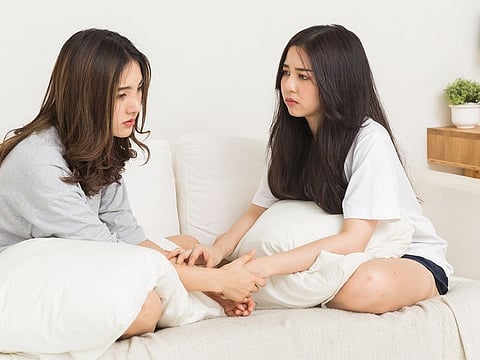Why do we accept toxic friendships in the digital age?
We need to understand that followers do not equal actual connections

Is the world just getting nastier or are we becoming more accepting of people’s nonsense? There seems to be a marked increase in behavioural toxicity, or so I felt. Perhaps I was being ‘sensitive’, that word so many use when you react to lines being crossed. Looks like there are others who share the experience….
Apparently, the digital age has both helped to identify toxic friendships and make us more prone to them, explains Silvina Joseph, a hypnotherapist, and wellness expert from the Jumeirah-based Charge Wellness and Hypnotherapy Center. It has also lead to a lack of genuine connections that result in people feeling isolated and unsupported. With the ‘follower count’ prominent on Twitter, Instagram pages, there’s now a pressure to maintain these large number of friends, says Joseph. It creates an environment where toxic behaviours, such as trolling, bullying, manipulation, belittling and constant criticism are normalised and even encouraged.
Toxic words and actions
This kind of toxicity becomes the standard discourse, explains Natalie Hore, a certified life coach and the founder of Breathes Wellness, a wellness clinic in Dubai. “Once people are constantly exposed to these kind of behaviours, they just become desensitised to it, whether they’re affected by it, or not.”
The digital age has both helped to identify toxic friendships and make us more prone to them. It creates an environment where toxic behaviours, such as trolling, bullying, manipulation, belittling and constant criticism are normalised and even encouraged.

Most of the time, people don’t talk ‘to’ each other on social media. They talk ‘at’ each other. Take a look at Twitter for instance, and the ‘quote tweet’ button, which means a person can just share your tweet. A person’s ‘quote tweets’ would include much vitriol from many others. “It’s a nexus of negativity,” says 32-year-old Charu Menon, an Indian corporate professional based in Abu Dhabi.
She has been on Twitter for over eight years now, and it’s normal to see bile being spewed, every day. “It’s horrible to say, but I’m just used to this now, with social media. It’s a public space, you get trolled, and there will be others who join in. You open Twitter, and you’ll always see people raging about something or the other. They quote-tweet someone else’s opinion with some snarky comment, and the rest of us like it. Then, there is an entire discussion of scathing memes about the original person’s opinion. We like it, because we didn’t like the original comment. I hate to say that I’m just as guilty as others,” she says. You aren’t seeing who is behind the keyboard; there’s no one to check. So, you keep typing into the void.
On social media, you’ll always find like-minded people whom you would like to follow. “Sometimes, we just watch someone else getting bashed, because we don’t like them. I think we’re all toxic in some way or the other,” says Menon. “And then, we are happy to make friends with these virtual people, because we want to be like them, in some way. We think they’re funny. Sometimes it feels good as these friendships can develop, but sometimes, it can backfire. You’ll be the one to get trolled by someone, one day.”
Moreover, when such connections just remain in the digital realm, it increases loneliness. While we are more connected than ever, the depth of connection is often shallow, elaborates Farah Dahbi, a psychiatrist from Lighthouse Arabia. “It can lack authenticity, which fuels loneliness. We may like a photo or sharing a meme but have a superficial understanding, or no real understanding, of what a person is genuinely experiencing in their inner world,” she says. Loneliness, low self-worth, the hope that things may improve, and difficulty setting boundaries are prevalent reasons individuals seem to be in these toxic digital friendships, she adds.
After being called ‘boring’ in school, Shreemi Khanna, now 42, was glad to be seen as ‘someone fun’ on Twitter. Exposed to a similar group of like-minded people who shared memes, fun tweets, Khanna was inspired, as well. “I could be sharp, witty and share the best memes. Thanks to all the retweets and ‘likes’, I felt validated by people that I had never seen before,” says the Indian expat, who works in Dubai as a freelancer and an aspiring author. The follower count, the number of retweets and ‘likes’ seemed empowering.
However, she realised that she was relying entirely on the unseen Twitter force to feel seen. “If some of my tweets didn’t get liked, I would feel low. So I worked harder to be funny. There were days of hate comments from random people, that would lead me to spiral. But I tried to tell myself, that trolling was normal.”
However, trolling was far from normal, and she would start deleting her own tweets that she thought weren’t getting traction. “I didn’t know who I was, I think. I was someone who was just living for approval from a social media website,” she admits. “My validation depended entirely on strangers.”
Dubai-based wellness expert Noona Nafousi explains, “So many of us seek external validation. A friend gets more likes on a picture than another friend. If all our self-worth is based on external validation, then this will hurt. And hurt, pain, and low self-worth are the perfect breeding grounds for toxic behaviour.”
Moreover, being overly reliant on other people for validation, self-worth, and a sense of identity can make it difficult to recognise and leave toxic relationships, says Joseph.
People with low self-esteem are more prone to accepting toxic friendships because they feel that they do not deserve better. They are also more inclined to struggle with setting boundaries and saying no to others, which can make it difficult to extricate themselves from toxic relationships, explains Hore. Another explanation is the emotional trauma a person would have undergone during childhood, says Joseph. Those who suffered emotional neglect as a child may struggle with feelings of abandonment and may have low self-worth. “They look for validation and connection from others, even if it means staying in a toxic friendship. They think that they won’t be able to find another friend.”
So many of us seek external validation. A friend gets more likes on a picture than another friend. If all our self-worth is based on external validation, then this will hurt. And hurt, pain, and low self-worth are the perfect breeding grounds for toxic behaviour.

Getting trapped in an echo chamber
The popularity felt reassuring to Khanna. Yet, it was also exhausting. “I was afraid. I was afraid to lose these strangers, so I worked so hard to be liked on social media. Twitter algorithims kept suggesting similar people’s tweets. So, I was constantly engaging with the same kind of people. If someone had different views, I saw them being trolled by people that I liked,” she says. “I feel guilty now that I never stopped them. I was too afraid … and now I see that I was just as toxic.”
“Algorithims prioritise content that users have already engaged with,” adds Hore. “This creates echo chambers, where viewers are only exposed to viewpoints that reinforce their existing beliefs. It leads to groupthink, a lack of exposure to opposing viewpoints, making it easier for toxic behaviour that goes unchallenged,” she explains.
“It is a solo activity, without usually the oversight or support of friends and family. This places the person in a more vulnerable position. Not just this, it enables behaviours that wouldn’t ordinarily go unchecked.” Even worse, social media allows for people to be anonymous and to use pseudonyms, Hore elaborates further. “It empowers them to say things that they wouldn’t normally say in person. It can also make it easier for people to attack others, without the fear of consequences.”
Algorithims prioritise content that users have already engaged with. This creates echo chambers, where viewers are only exposed to viewpoints that reinforce their existing beliefs. It leads to groupthink, a lack of exposure to opposing viewpoints, making it easier for toxic behaviour that goes unchallenged.Natalie Hore, life coach and wellness expert
Menon cites a simple instance. “The other day, I put a tweet on how I didn’t like a certain type of Indian food. I got half a dozen hate comments,” she says. “Some people shared my tweet, saying that I didn’t know what I was talking about. Then it became a lengthy discourse by two people on people who don’t appreciate ‘good food’ anymore. They’re talking about my preferences, while trashing me.”
How would she have handled a situation without social media? “First of all, social media is just a public space where you can blare whatever you want, unfortunately. In pre-social media days, I would have just shared this opinion with friends, not random strangers. If my friends had a problem, we would sort it out. If it’s a fight that gets out of hand, I would just walk away,” says Menon.
The pressure to present a certain image online and offline
“Overall, the digital age has both broadened and complicated our understanding of friendship,” elaborates Joseph. Twenty-two-year-old Sukayna Kazmi, an Indian communications professional recalls the time she felt ‘toxic’. Based in Pakistan, she says that everything changed when social media took centrestage.
Kazmi felt like she was in a ‘rat race’. Watching her classmates’ constant updates and stories on social media made her feel as if she had to keep up with their lives. “I became friends with people who influenced me to become who I wasn’t, and made me feel insecure,” she says. Kazmi felt that she had to put up a ‘façade’ to be accepted. “I was surrounded by people who looked like models, and always looked so glammed up. Seeing this online made me feel as if I had to step up my game,” adds Kazmi.
As the social media presence was considered paramount, she began applying makeup with vigour at the age of 15. She was afraid of being judged, and left behind. Being a part of group chats felt equally pressurising. The conversations were all about latest trends that she didn’t know, and neither would anyone inform her about. The struggle to keep up was wearing her down.
By the time she was 18 years old, she realised that regardless of how hard she tried to fit in, she would never be happy. “I felt like I was toxic, too. I had lost contentment within, just because I wanted to be with people who would not even check on me, ever.”
As she entered university, the digital friendships fell away and she could start over organically. “I made friends in university who wished for my growth, who wished the best for me and are still connected with me till date. I’m glad that I learnt to see beyond the surface level, to see beyond the world of social media, beyond these toxic individuals I once called ‘my closest friends’ and choose myself at the end, even if that meant I had to lose everything I built up in my teenage years just to look ‘cool’.”
The fear of ‘unfollowing’ and ‘hiding stories’
We’re always afraid of what people think. With social media, this fear gets compounded. In the earlier days, we dropped out of contact with toxic people. Now, we follow them on social media and are unfraid to unfollow.
Twenty eight-year-old Sara Mousa, a Canadian-Egyptian Communications manager based in Abu Dhabi agrees that people are more prone to toxic friendships now. “Sometimes we still remain in contact with those toxic people, following them on social media, instead of deleting them, even when the friendship adds no value,” she adds.
Elaborating further she says, “Sometimes, we feel the need to maintain a wider friendship group. Within those circles, we have toxic friends, and we don’t want to create conflict. This ties into social media. Unfollowing is a major insult or message to the person that you are cutting all ties, even if it is someone you rarely speak to.”
The ramifications of toxic behaviour on social media
It is anxiety inducing to be constantly exposed to toxic behaviours on social media for many people.
It can lead to feelings of depression and stress, explains Hore. “Cyber-bullying is detrimental to mental health. Moreover, such behaviour can strain or damage relationships, both personal, professional and even career prospects,” she adds. It also leads to further polarisation and reinforce existing biases. “These kind of patterns of cyber-bullying, gaslighting, talking ‘at’ someone, makes it harder for people to engage in constructive dialogue,” says Hore.
Khanna felt exhausted with trying to keep up with this virtual life. “I was just spending time on Twitter and Instagram, watching the level of engagement each post got. I kept living in fear of losing these people, that I didn’t even know. The days when people liked my tweets, felt good. Other days when I got trolled, were terrible. “
She finally took a break from Twitter, when trolling got out of control. “I think it was because I made fun of an actor. The attacks just didn’t stop. My mental health was in shambles, and I felt alone, so alone. I saw the worst negative comments levelled at me, by people I thought were friends on social media. I was in depression for a long time,” she says.
She deactivated her Twitter account and made a new one, months later. “I just blocked any possible troll, since. After therapy and meditation. I did a lot of sensory grounding, journaling, went and worked out more, which was my way of beating the anxiety,” explains Khanna.
Khanna learnt to keep a balance between Twitter and her life. “I needed to rebuild my real friendships. More importantly, I needed to rebuild myself. I did frequent digital detoxes, where I wouldn’t touch my phone for a day. I monitored how much time I spent on the app, and worked hard to focus on meeting more people, rather than staying on Twitter,” she added.
In the days without social media, Khanna feels that her validation came from people that she knew well. “There was none of this sly tweeting, or just communicating with memes, when we had nothing to say. If we had a fight, it was just between us. Nothing was so glaringly public as it is now, and I wouldn’t always feel in the spotlight. We just had more direct conversations, on the phone.”
It is more intense now in the digital age as it has made us more accessible, no matter where you are, which can make you feel trapped. Not only are you dealing with toxicity in person, you are constantly at the receiving end of text messages and social media interactions, making it harder to disconnect from that relationship, explains Navine Eldesouki, the founder of the women's network, Coffee with an Expat.
So, in a nutshell, social media seems to have made us more accepting of negative, disrespectful behaviour from people. Perhaps it is time to draw a hard line.
Start by setting boundaries
“The key to healthy online behaviours is to set clear and strong boundaries. This might include unfollowing, or blocking toxic individuals, taking breaks from social media, or limiting the amount of time spent on it,” says Hore. She explains that you also need to not engage in toxic behaviour, yourself. “It can create a positive mind shift. It may sound simple, but there is extremely positive mental benefits to using respectful language, listening to others, and engaging in constructive dialogue,” she adds. Report abusive behaviour, and advocate for platforms to take more serious action, she adds. Look at what you can tolerate, and stand firm on your limits.
Engage in more personal connections
Nafousi remembers spending hours on the phone to her best friend after school. “The only way we connected was through real life conversations and seeing each other. Even though we are so much more ‘connected’ socially we have lost that human connection. People are much lonelier and I believe this has had a huge impact on our mental health as well as the strength and depth of our friendships,” she adds.
She explains this point further. No matter how much we connect online, we do need human connection. We need to be in each other's physical company. “It is essential to our makeup. When we connect online and have less human connection that creates a sense of loneliness. This is also compounded when we are seeing other people’s highlight reels, and we have the ability to feel left out more than ever when our friends are together and we are not involved,” she adds.
Refrain from spreading negativity
It’s all fun to see hilarious memes made at someone else’s expense, but remember you are just spreading more negativity. Let the buck stop with you.
Monitor the time you spend on social media
Take frequent breaks from social media. Don’t let the ‘likes’ and number of followers, retweets control you. Focus on the real world, and work hard to avoid mindless scrolling. Set time limits on how much energy you spend on social media, say the experts.




